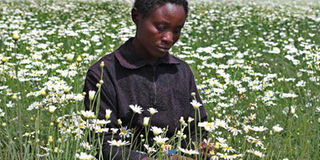TZ soon to lead world in pyrethrum production

A woman harvests pyrethre flowers, which will later be dried to produce pyrethrum,a natural insecticide
What you need to know:
The TPB Director Lucas Ayo, revealed this when he was speaking on a report about a successful pyrethrum farmer, Mr Ford Kilale, from Ipelele Village, Makete District, Njombe Region.
Mbeya. The Tanzania Pyrethrum Board (TPB) has expressed optimism that the country will become the world’s leading producer of pyrethrum in the few years to come.
The TPB Director Lucas Ayo, revealed this when he was speaking on a report about a successful pyrethrum farmer, Mr Ford Kilale, from Ipelele Village, Makete District, Njombe Region.
Mr Kilale has broken the record after selling pyrethrum with a toxicity of 1.9 per cent and earning for himself Sh2,700 per kilo this season.
Mr Ayo said the farmer had attained this year’s goal as his pyrethrum could elevate Tanzania in the world market and surpass the countries such as Rwanda and Kenya on the African continent.
Earlier, a report by Pyrethrum Company of Tanzania (PCT) Ltd said Mr Kilale had been the first to get a higher price of pyrethrum among 25,000 farmers from the regions of Mbeya, Njombe, Iringa, Arusha, Manyara and Hai District in Kilimanjaro Region.
The Food and Agriculture Organisation lists Tanzania and Papua New Guinea as the top two producers of pyrethrum in the world.
PCT General Manager Martin Oweka said this year’s pyrethrum was being sold based on quality as the first grade with toxicity of between 1.8 and 1.89 per cent was sold at Sh2,700 while the second grade with a toxicity from 1.7 to 1.79 per cent fetched Sh2,600.
He pointed out that the sixth grade pyrethrum with 0.9 per cent of a toxic continued to be sold at Sh1,500 per kilo.
“From July to October 10, this year, the PCT has been able to purchase 700 tonnes of pyrethrum, from which farmers have been paid Sh1.5 bn,” said Oweka, adding that the highest price was now sold at Sh2,700 per kilo.
Mr Oweka said there was a sign that, due to this year’s good purchases for pyrethrum, many a farmer would follow instructions by agricultural experts including reaping blossoming flowers, putting them in the sun to dry and selling them within seven days.




